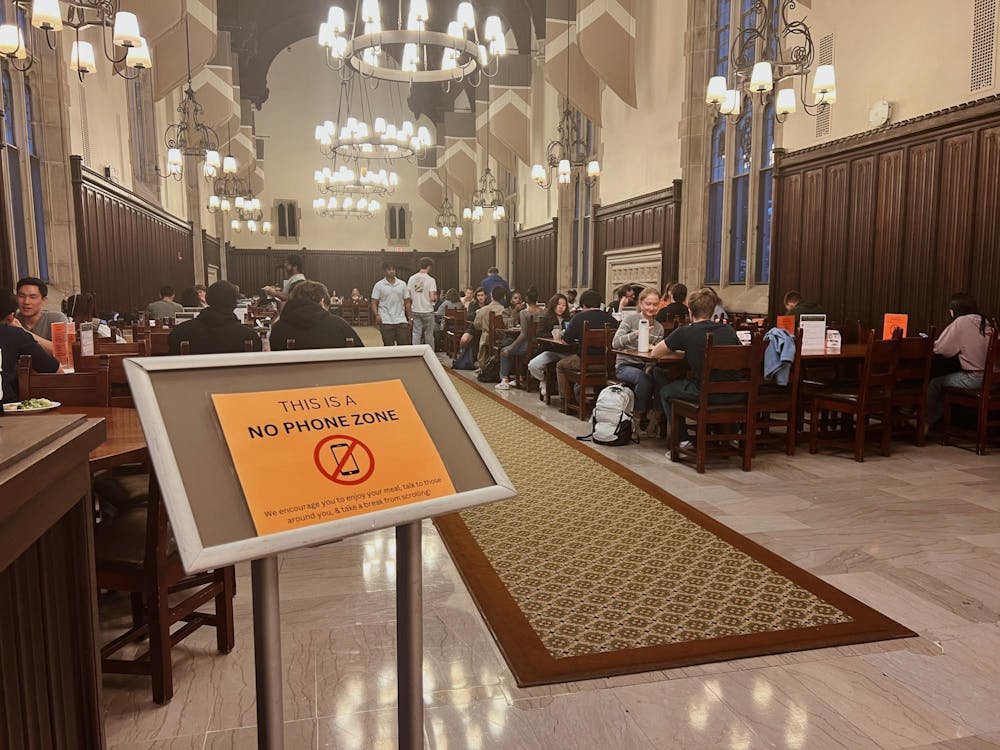Scrolling alone during meals? A new pilot program aims to encourage you to put your phone away while you eat.
The Rockefeller College staff is piloting new “No Phone Zones” this semester at four tables on the Rockefeller side of the Rockefeller-Mathey (RoMa) Dining Hall. The program comes in response to calls from students for unplugged spaces, and concerns about the damage cell phone use may be doing to the community.
“We’re throwing spaghetti against the wall, and we’re going to see if it sticks,” Dean of Rockefeller College Justine Levine said about the new project.
When the ‘Prince’ visited the “No Phone Zone” tables in Rocky’s dining hall at 6:15 p.m. on Wednesday Sept. 25, three out of four tables were occupied by just one student, all three of whom were scrolling on their cellphones. One student declined a request for comment because he was busy messaging his friend.
The fourth table was in use as the Chinese language table for the evening, but when asked whether participants would use their phones at the table — even though they were not sitting in the section for the explicit purpose of unplugging — the group replied that the signs did encourage them to put their cell phones away for the duration of their dinner.
In an interview with the ‘Prince,’ Levine emphasized that she was inspired to take action against excessive smartphone use in her capacity as Rocky College Dean after reading two pieces published in the ‘Prince’ in the past two years. Levine cited Vitus Larrieu’s personal essay from July 2023 about his attempts to give up his smartphone and Christofer Robles’ March 2024 op-ed calling for the University to help students put down their phones, saying both pieces were “inspirational” in the development of the “No Phone Zones” in RoMa.
Alongside these calls from students, Levine also explained that the Rockefeller College Staff went on a retreat over summer 2024 that inspired her to think about ways to get the Rockefeller community unplugged. After reading Priya Parker’s “The Art of Gathering,” the staff felt compelled to facilitate more authentic community connections through unplugged spaces.
“Sometimes people actually need rules in order to do the things that they want to do, in order to be present,” Levine said. Born from the inspiration they took from Parker’s concept of “I Am Here Days,” the Rockefeller College Staff decided to dedicate four tables in the dining hall to phoneless conversation and gathering.
Levine insisted that the “No Phone Zones” are “just an experiment.”
“If [students] want to do that, if they want to sit at a table and try to challenge themselves, we’ll provide some conversation pieces,” Levine said. “We’re seeing how it goes at four tables. It’s hardly [any] of our dining hall at all.”
“We want to see if it is helpful for the students,” she added.
Levine does not see a future where the Rockefeller side of RoMa becomes fully unplugged, citing the crowdedness and the benefits of having “No Phone Zones” as an option rather than a requirement.

“I don’t think it’s reasonable to ban cell phone use on our side of the dining hall, and our dining halls are really crowded, so I think it’s important to give people a choice,” she said. “But I think if we can signal that this is important to us, maybe it’s important to you. Then, maybe people will make that choice regardless of what table they're sitting at.”
Levine noted, even as one of the architects of the “No Phone Zone” experiment, that it could be challenging to eat a full meal apart from her phone.
“I sit down there sometimes, and I actually find that if I’m sitting by myself, it’s hard to not look at my phone because I am so conditioned to pulling it out all the time,” she said.
This new experiment is not the only initiative that Rockefeller College has in place as an opportunity for students to put down their phones. On Friday afternoons from 4–5 p.m. in the Rockefeller Common Room, the college staff invites students to join them for Rockefeller Rest & Relaxation, where students can “grab a seat on the comfy chairs, bring a crossword puzzle … work on a craft, and enjoy a treat.”
Further down campus, Butler College has also made a commitment to helping students get off their phones, hosting “Butler Unplugged” dinners on Wednesday nights from 6–7 p.m. with aims to reduce dependence on phones, spark new connections, and develop conversational skills in attendees.
However, when the ‘Prince’ visited the Whitman/Butler dining hall at 6:30 p.m. on Wednesday during the designated time for “Butler Unplugged,” no such event was visibly taking place in either the main dining room or the additional seating area.
With the “No Phone Zone” pilot, residential colleges have unveiled a new tool in an effort to curb smartphone usage and encourage social interaction, but it remains to be seen whether such attempts will be successful.
Hallie Graham is a staff News writer for the ‘Prince.’
Please send any corrections to corrections[at]dailyprincetonian.com.








